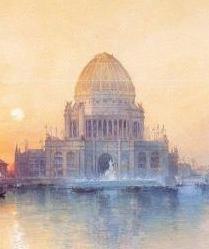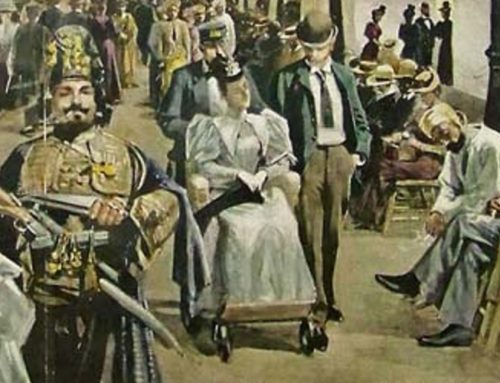Thomas Edison visited Chicago on May 12, 1891, staying for several days “to attend to some private interests” and to consult with Prof. John P. Barrett, Chief of the Department of Electricity and Electrical Appliances for the World’s Columbian Exposition. [“Proposition for a Compromise” Chicago Inter Ocean May 12, 1891, p. 8.] The article below, from the front page of the May 12, 1891, issue of the Chicago Evening Post, describes his interest in the 1893 World’s Fair and his imminent, but unnamed, invention that will allow a viewer at home to watch a remote performance on a screen using an electrical connection. Imagine that!
On a side note: Evan I. Schwartz, in his 2009 biography Finding Oz: How L. Frank Baum Discovered the Great American Story, attributes this anonymous article in the Evening Post about a giant-headed wizard to Baum, who had recently moved to Chicago from Aberdeen, South Dakota. Baum biographer Michael Patrick Hearn refutes this idea on the basis that Baum was not working at the Post at the time this article was published. [Children’s Literature Association Quarterly Fall 2010, p. 313.]
One paragraph, containing a racist expression, is omitted.

Thomas Edison’s apparatus and a bust of the inventor on display in the Electricity Building at the 1893 World’s Fair. [Image from Bancroft, Hubert Howe The Book of the Fair. The Bancroft Company, 1893.]
EDISON’S IN CHICAGO
______
The Wizard of Menlo Park Stopping at the Auditorium
TELLS OF HIS LATEST INVENTION
______
Phonograph and Camera That Will Reproduce a Concert or a Prize Fight – Helping Professor Barrett
Thomas A. Edison is in the city. The wonder of the age, one of the world’s truly great, he bears his honors easily. Naught is there about him to suggest the egoist. A massive head is his, but it is not “big.” He is one of those rare men who achieve success and wear it as an ornament. In short, he is approachable as when he started on his great career. In him indeed the lightning has a kind a master.
As he entered the Auditorium Hotel this morning the throng that fillet the rotunda parted to let him pass. But few knew of his coming but nearly all recognized his strong, clean cut features from familiarity with the numerous pictures that frequently adorn the pages of some publication. Those who did not recognize his features saw in him a man at whom one looks twice and the second look they gave. Of medium height is the wizard of Menlo Park, whose finely shaped head and frank open countenance, brightened by a pair of gentle, intelligent eyes, sits on a frame square-shouldered stout erect and sturdy as an oak. He speaks in a low, clear, distinct voice and illuminates his utterances with a smile.
Greatly interested in the world’s fair is the wizard, though his errand is of a commercial nature rather than to take part in the controversy regarding the division of the electrical exhibit. Of a division he is not in favor.
“The Electrical exhibits should be together” he said quietly earnestness of absolute conviction. “ The exhibit at the Paris exhibition was divided into many parts, so that to see them all required one to walk about fifty miles. It was a fine display, but its effect and much of its values was lost by reason of its not being together.”
“It will be a great mistake to separate the exhibit here.” As Professor Barrett, a very worthy, able man says it should be together. It might not be of harm to have the dynamos in one building and the rest of the exhibit in another; still the greatest effect is to be obtained from a grouping of the whole.”
…
It has been stated that the invention which Mr. Edison is to exhibit at the fair as his piece de resistance is something that will surpass in its surprises anything that ever came from his wonderful workshop. The first wonder was the telephone and following it the phonograph. The one destined for Chicago to present to the world will embrace the elements of both and be equal if it do not exceed the sum of their combined mysteries.
“But,” he explained “this invention will not have any particular commercial value. It will be rather of a sentimental worth. What is it! We-el — he hesitated as if loth to part with his secret, then seeing the look of expectancy in the faces of his listeners released a diminutive laugh and said:
“It is not yet completed. But when it is it will surprise you. I hope to be able by the invention to throw upon a canvas a perfect picture of anybody and reproduce his words. Thus, should Patti be singing somewhere, this invention will put her full-length picture upon the canvas so perfectly as to enable her to distinguish every feature and expression of her face, see all her actions, and listen to the entrancing melody of her peerless voice. The invention will do for the eye what the phonograph has done for the voice and reproduce the voice as well, in fact more clearly. I have already perfected the invention so far as to be able to picture a prize fight — the two men, the ring, the intensely interested faces of those surrounding it — and you can hear the sound of the blows, the cheers of encouragement and the yells of disappointment. And when this invention shall have been perfected,” said Mr. Edison with he trace of enthusiasm’s glow in his face, “a man will be able to sit in his library at home and, having electrical connection with the theater, see reproduced on his wall or a piece of canvas the actors and hear anything they say. The only thing the invention wants is that finesse to reproduce the most delicate features and expressions.”
“But you will be able to supply that want!” someone anxiously inquired.
Mr. Edison smiled by way of reply and in a way that all doubts were swept away. Speaking of the main object of his visit, he said it was to look into arrangements of the Edison company for extending the lighting system throughout the city. Asked if he had any new surprises to improve the telephone, he replied in the negative.
“The telephone is old,” he said; “I want something fresh to attract my mind.”
He was much pleased to learn of the progress being made by the officials of the world’s fair.
“Everything is running smoothly,” said an acquaintance, “and a little variety in order and then given to the work by [word missing] Phoebe Cousins.”
“Ah,” said the wizard raising his hand in supplication, “A woman is a wonderful being, full of mystery and hard to [word missing] –”
“As electricity!”
“Harder.”
It is not expected, as has been stated, that Mr. Edison will take any part in Professor Barrett’s controversy over the electrical building. As he said today, he is not here for that purpose. He expects to spend a great deal of money on his exhibit, but like all the other great electrical firms is willing to trust Professor Barrett with the preliminary arrangements. He has had world’s fair talks with the electrical chief and pronounces him a man of good hard sense, able to work up the best electrical exhibit that has ever been brought together. Mr. Edison’s own exhibit will be one of the wonders. The Eiffel tower was the only greater attraction at Paris than the Edison exhibit, and the great inventor is confident that his showing here will be equally prominent.






Leave A Comment